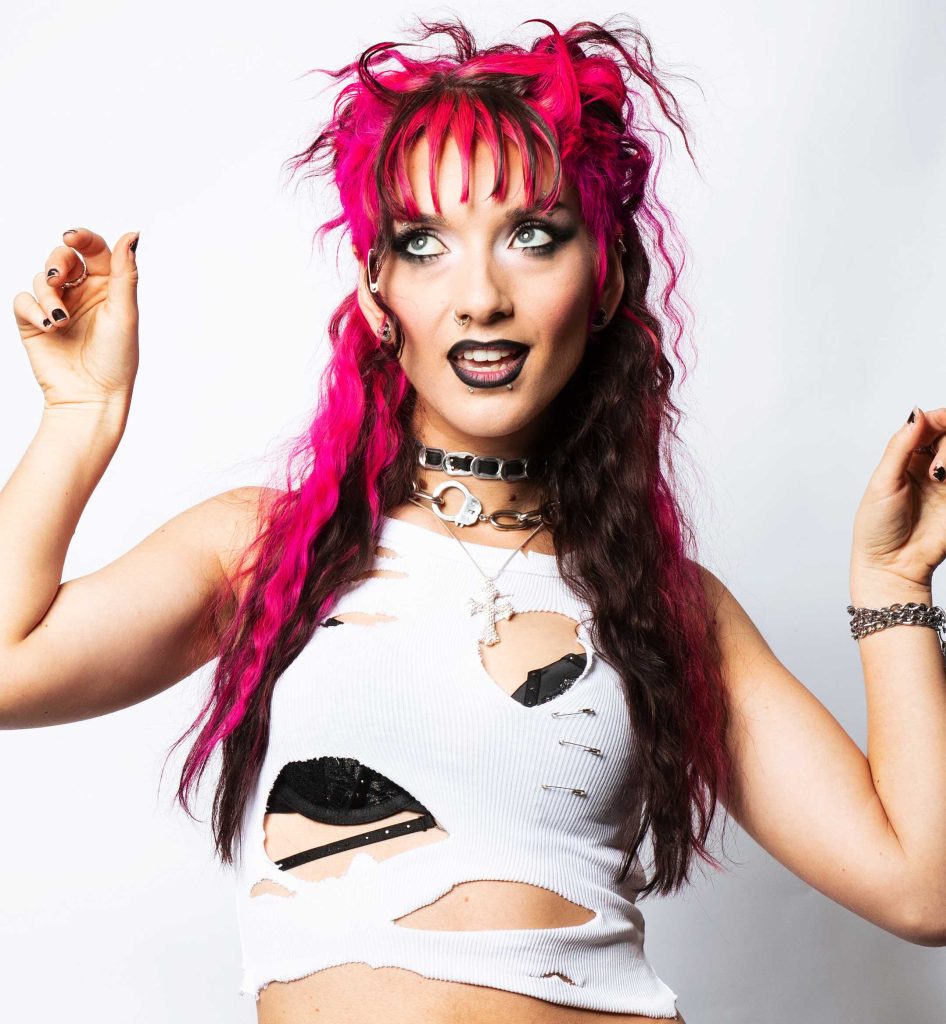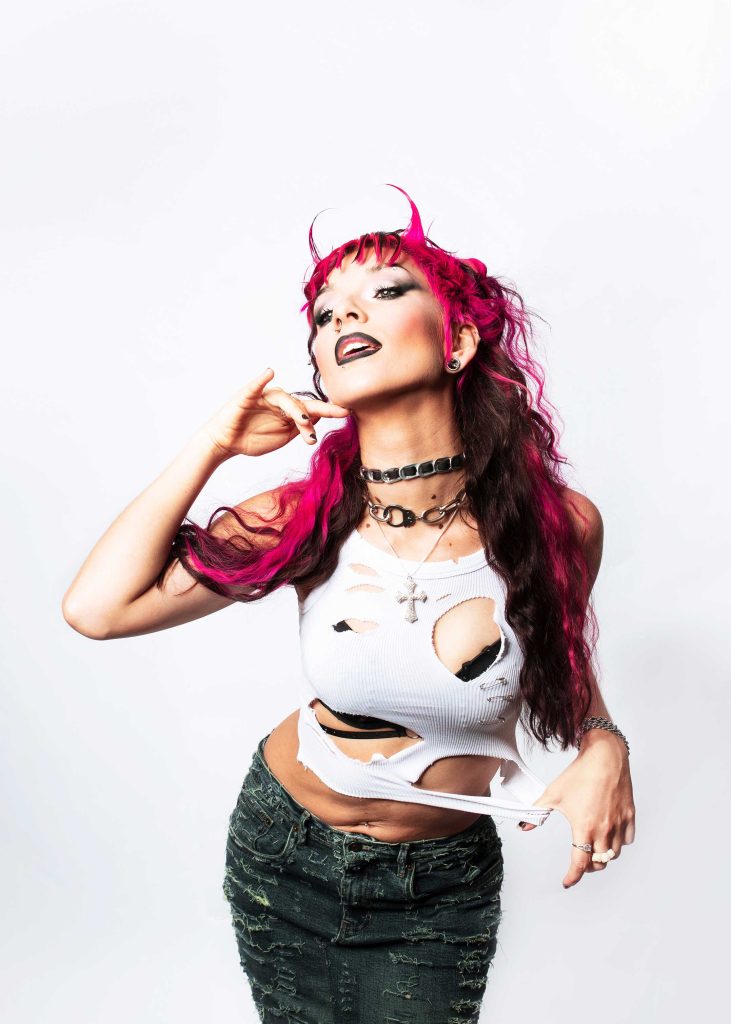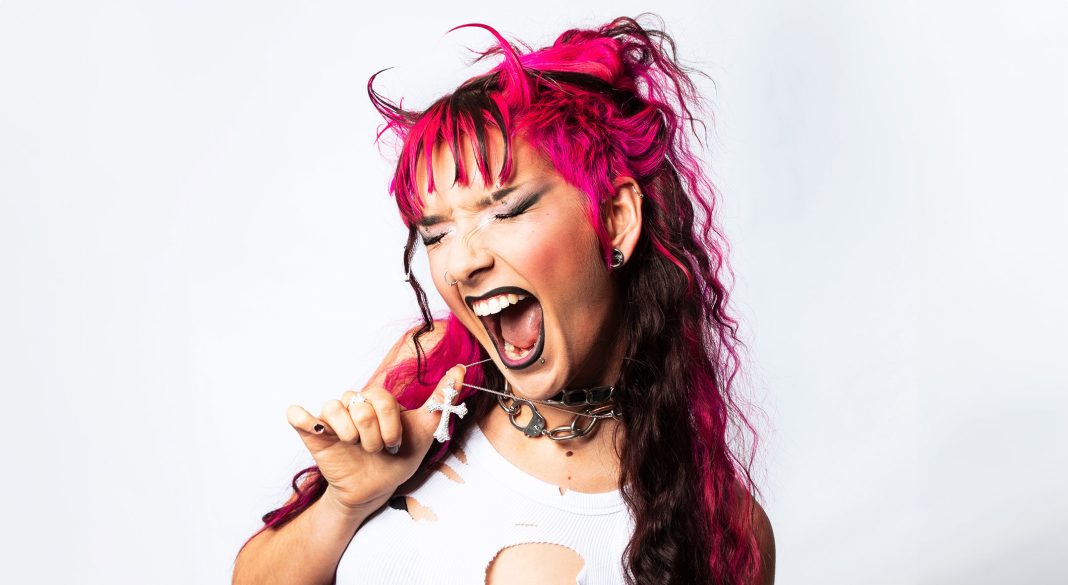Delilah Bon is the Elle Woods of rock. Tired of having her musical visions squashed by producers, she took control of the reins and taught herself how to create her own tracks entirely. What comes out of her creative process is brat-punk – a rage-fuelled musical beast of its own kind that melds the Y2K, R&B stylings of Destiny’s Child with the satirical crudeness of Eminem. It’s a swirling vortex of Bratz dolls and hot pink and fuzzy guitar, and it’s landed her on stages at festivals such as Glastonbury and even on TV in France. What? Like it’s hard?
Delilah – whose real name is Lauren Tate – is having one of the biggest years of her career so far. With her second full-length record, ‘Evil, Hate Filled Female’, due to land this September and a tour to follow, she’s never been booked and busy to this capacity before. But it didn’t happen overnight. Before the conception of Delilah, Lauren was putting out music with her grunge band Hands Off Gretel. She grew tired of the misogyny she was facing in the alternative music space, and her anger was channelled into the creation of her alter-ego. Thus, an army of ‘Bon Bons’ grew in response.
On a July morning, Delilah perches by a window at her home in Yorkshire to give The Forty-Five the lowdown on courage, collaborations and the importance of creative control…
Hi Delilah! It feels like things are really blowing up for you at the moment. How are you feeling right now about your career? From an outside perspective, everything seems amazing. Does it feel that way?
“Yep! It’s a mixture of many feelings at the minute because it’s the busiest I’ve ever been, it’s the hardest I’ve ever worked, and I think because I’m working so hard when the big moments come, I’ve not been able to take them in just yet. I think, ‘What have I done this month?’ I can’t remember, and then I think, ‘Oh, I played Glastonbury! That’s what I did.’ I’ve got to keep reminding myself of everything that I’m doing. I’m on track, everything’s going well even though I’m stressed. I think when this year has ended, I’m going to look back at it and think ‘Jesus, I’ve done so much.’ It feels wicked to finally feel like my music’s getting recognised.”
You’ve been an artist for a long time now. In your songs ‘Finally See Me’ and ‘Hey World’, you talk a lot about being overlooked in the industry and feeling outcast. What do you think is the key to your resilience?
“Whenever I feel a bit overwhelmed or I start to doubt myself, I remember where it started and imagine myself singing to Britney [Spears] when I was little. I think sometimes I’m doing it for her [young Delilah], sometimes I’m doing it for me, sometimes we’re the same person. But whenever I feel overwhelmed, I just have to remind myself how far I’ve come. When I see my fans and they tell me how much my music means to them, that’s the fire I need every time.”
Speaking of resilience, you’ve faced a lot of negative reactions from people on the internet, particularly in regards to your track ‘Dead Men Don’t Rape’. When you’re playing a festival or you’re in an atmosphere where people aren’t familiar with you, how do you keep the courage to be authentically yourself and channel the messages that you care about?
“We had that when I played shows with Shaka Ponk in France, it was a completely different audience. It was like a majority male, older rock audience. I think what keeps me confident and believing in myself is Ruena and Hela, the girls that I perform with. Before we go on stage, we always hug each other, we remind each other that even if people don’t like it, we believe in what we’re saying. I think if I were getting up there on my own, it would be terrifying, but I look either side of me, and we’re all together. I don’t get stage fright anymore. We do what we do. If people don’t like it, that’s fine. Even if it’s just two people in the crowd that need to hear those lyrics, it’s so worth it. I’m not scared anymore.”

What advice would you give to other young performers who may face a similar situation?
“You have to just truly believe in what you’re saying and ground yourself. When you’re on stage, sometimes you can go into your own head. You can think negatively or you can look at people and wonder what they’re thinking, but I think [you’ve got to] remind yourself there’s a reason you’re playing this stage. You’ve been invited to play here, you’ve got every right to be standing there. Just scream it from the rooftops, even if it’s just going to change one person’s mind or influence or inspire one person. And don’t get too drunk! [laughs]”
How do you see your live shows changing in the future? What would you like to adapt and grow?
“It’s always props. I went to this one festival in France and this man came out on a dragon. I was like, ‘How do we do that?’ I want big props. I went to see P!nk when I was about 12 and it was the Fun House tour. I think she came down on a slide. I thought, ‘I want to have a big stage show one day with props and loads of dancers and visuals.’ My sister does art and she made a logo that kind of spun around for a few festivals I played. I want more of that. My mind is everywhere when I think of the live show because I have to always tame it back and remind myself I’m not at that point yet, but eventually I will be.”
Your visuals and sound seem very Y2K-influenced. There was an article that came out recently about how we’re in an era of Hannah Montana pop stardom. We’ve grown up watching these amazing women in our childhood, and it’s leaking into our own art and music. Are you heavily inspired by that era?
“Definitely. When I’m making my outfits for a tour, I look at them and they remind me of something. My mum will go, ‘I swear you used to own an outfit that looked like that and you wore it at the school disco.’ The 2000s are back, and it’s so crazy that that was over 20 years ago. But all of it, Hannah Montana, That’s So Raven – it’s a massive influence on [my] image and music as well.”
You have a very DIY approach. It’s great to hear you produce your own songs, how did you get into it?
“Originally because I couldn’t describe to producers what I wanted. I’d be in the studio sitting behind the producer and it was always a man. I would have an idea and then not be able to explain what I meant, and then be spoken down to and made to feel like I don’t know what I’m talking about. I started to research more into production so I could explain myself better, and the more I learned, the more I’d have ideas and think, ‘I’m sure my idea is better than his idea, but because I’ve got no experience and nothing to show for myself, nobody will believe in me.’ I had one producer tell me, ‘You’re the singer, I’m the producer. You need to let me do my job so I can let you do yours.’ I hated that, because I’ve always wanted to be involved in the overall sound. I started doing demos on my own and then worked up from there. I started doing that when I was about 20, and I’m 27 now. I watched a few tutorials, but most of it’s just been experimenting, clicking buttons, trying to work out what things do, and I love it! It’s just working on my own and being able to just create whatever I want without somebody telling me my ideas don’t work.”
There’s a real element of vulgarity in your lyrics which is quite humorous. Is this something that’s consciously written into your music, or does it occur naturally as a release of anger?
“I think it [does come naturally]. Because I write a lot of angry songs, people assume I’m an angry person all the time, but I’m really not. I can be angry about the things I’m passionate about, but a big part of who I am is my sense of humour. I was such a mischievous kid, always in trouble, always drawing willies on everything. I realised I don’t have to be serious all the time. A lot of the time in the studio, I write lines and think, ‘Ooh, that’s hilarious.’ Certain [lyrics] like ‘finger blasting your mother’ [from the album’s title track], I write them and I think, ‘I can’t wait to see my dad’s reaction to this.’ [laughs]. It’s quite addictive. It feels freeing to just be vulgar.”

What track on the new album do you think is likely to get the most reaction?
“I think maybe ‘Epstein’. I don’t know. I change my mind every time, but I’ve never done anything like that song before because that one’s very soft, but then very angry at the end. If you’re in a mood where you want to burn the world, I feel like that song is the one that’s going to make you erupt.”
Do you have a personal favourite yet, or is it just not possible to pick a favourite child?
“Oh, it changes all the time. I think currently my favourite is ‘My Girlz’.”
You’ll be on tour following the album release. What kind of emotion or feeling do you hope the audience take with them after a show? What can people expect?
“Gay panic is a big one. That’s what I hear a lot. It’s just empowering. It’s therapeutic, it’s cathartic. The show is very rage-filled, but it’s also very fun and freeing. You can just be yourself. You can dress how you want to dress, be how you want to be. The whole room is [filled] with people that are like-minded, that are gonna be your new friends. Everybody makes friends at my gigs, it’s wicked.”
I know you’ve done a couple of collaborations already, but are there any other dream collabs that you hope will be in the near future for you?
“I’ve set my eyes on Yungblud. We could do like a weird Addams Family kind of [collab] and he’d be the brother.”
If in the next three years all your dreams were to come true, what would happen for you?
“Well, my shows would be bigger and I’d have all the props that I wanted. And I’d be able to move out of my family home and have my own house. I would paint it entirely pink. It’s going to be my Bratz dream house.
That is the dream.
“Come to my house! Let’s do it.”
A pink house with many cats and many dogs?!
“Oh yes.”
Evil, Hate Filled Female by Delilah Bon is out September 13 2024


